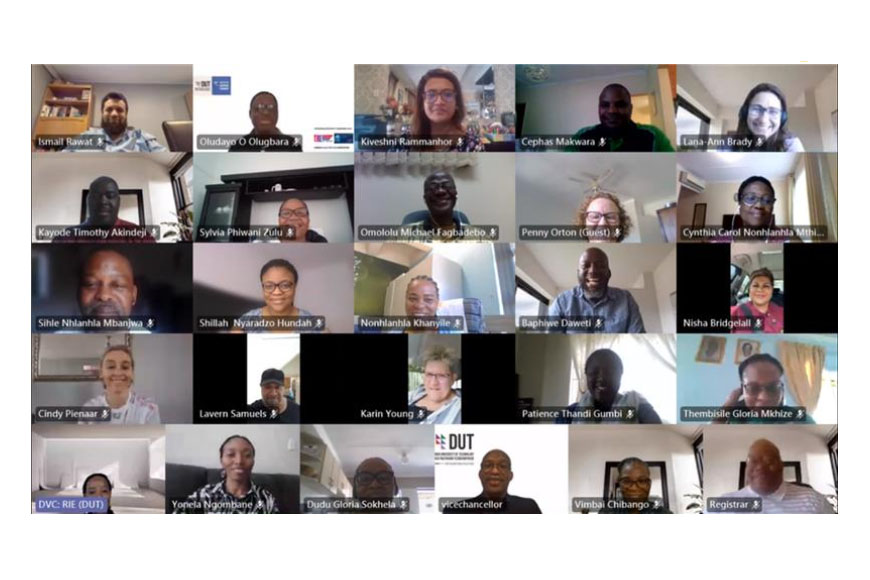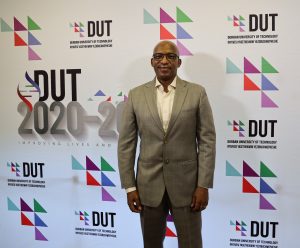Professor Thandwa Mthembu, Vice-Chancellor and Principal at the Durban University of Technology (DUT) delivered the keynote address at the first discussion at the DUT Dialogue Series for Emerging Scholars, a platform created by the Office of the DVC: Research, Innovation and Engagement (RIE), Prof Sibusiso Moyo and Head of the Research and Doctoral Leadership academy (RADLA) and GenderJustice, Health and Human Development, Prof Cheryl Potgieter.
The DUT Dialogue Series for Emerging Scholars is a platform that aims to provide an opportunity for emerging scholars, academics and leaders to engage on scholarly and leadership matters that impact the higher education sector.
Prof Moyo welcomed Prof Mthembu and sketched his major contributions to higher education in the past three decades, as a Leader and Vice-Chancellor. She indicated that the audience were very interested in his presentation on “Leading Complexity in Higher Education” and the wealth of experience he had to share.
In his introduction, Prof Mthembu stated that hopefully at the end of his talk staff would be able to assess whether they “belong” at DUT. Prof Mthembu’s primary argument was that people at a University need to understand what their role is. He reminded the audience that he has often emphasised that a university needs the right people, sitting in the right seats and playing their roles right.
Prof Mthembu, said staff and students at DUT, should be aware of their own personal identity, culture and behaviour. He used Abraham Maslow’s psychological theory the Hierarchy of Needs and the Maslow identity grid to locate his talk.
He explained that the “Maslow Identity grid would help each one of the attendants and many others who were not present to determine whether they belong at a university, let alone at DUT. Maslow’s hierarchy has five stages of needs from the lowest to the highest which motivates human behaviour. The lowest which is physiological includes human need, for example, water, food, shelter and the highest need is self-actualisation. Maslow’s Hierarchy of needs thus helps us to understand identity and career development within a university setting.
He defined identity as the fact of being who or what a person or thing is, culture as the ideas, customs, and social behaviour of a particular people or society and behaviour as the way in which one acts or conducts oneself, especially towards others.
“I am going to describe the people who belong in these different blocks. Your test after I have finished explaining what happens in each of these blocks, will be for each one of you to determine where you belong.”
In Physiology & Safety, we have people who are stuck in the physiological needs, wanting to eat, to drink water. These are the types of people who are not shy because they could not get their NSFAS allowances to burn the whole university, just because they couldn’t eat whatever they needed to eat. So, the university may as well burn down because they didn’t eat, they don’t care about any of us. In terms of staff the people who belong in this block, is the academic who graduated a number of years ago and is only interested in the cheque, they are just here to get money to feed their families. It is the alumni who expect the university to give them jobs and tenders. They make many claims about favours they made for one to get appointed. They forget that the University does not owe them anything,” said Prof Mthembu.
Moving to the Love/Belonging & Safety block, Prof Mthembu said these are the people who do not only think about themselves but also about their employment, whether they are doing the best they can. He said these are people who begin to think harder about anything else around themselves, including the jobs they are in, academics who are looking forward to their students being successful, who want to make an impact in the entire university. Describing students in this block, Prof Mthembu said these are students who participate in a number of activities that involve not only themselves but their fellow students He said these are alumni who are not looking for tenders at the university. In the Self-actualised & Esteem block, Prof Mthembu said these are DUT’s real top people, the creative people, the students who take advantage of opportunities provided at DUT, they are creative, innovative and solve problems. In terms of staff, he said these are the Researchers, top Professors who are producing some of the best Masters and PhD students. Included in this block are alumni whom DUT is proud to be associated with because they are doing great things in the broader society.
In closing Prof Mthembu advised DUT students and staff to think hard about themselves, whether they have been able to elevate their personal culture to institutional culture and whether their actions are about pursing knowledge and truth. It is about advancing DUT in the interest of many generations to come.
Facilitating the robust question and answer session was Prof Cheryl Potgieter who has a doctorate in psychology and thus very familiar with Maslow’s work. She said it was very interesting how Prof Mthembu had engaged Maslow’s theory in relation to DUT and also pointed out that your background does not determine if you are functioning at the lowest or highest level. She pointed out that the examples which Prof Mthembu has used also indicate that the poorest student could be functioning at the highest level of Maslow’s Grid.
Dr Nonhlanhla Mthiyane, Head of School of Education in her vote of thanks expressed her gratitude to Prof Mthembu for challenging the DUT Community to go out and do tangible activities to let the lived DUT values be alive in order to see the tangible difference in the way the students and staff behave. She emphasised that this will assist DUT to get to its aspired ENVISION2030.
In closing, Prof Moyo thanked all the contributors and attendees for the excellent turn out at the 7:30am session and for engaging actively in the dialogue.
In terms of participant feedback, she quoted input from Dr Maud Blose, an Emerging Scholar, who wrote:
“Thank you, Prof Mthembu, for this dialogue. We need more regular series of this magnitude. Both staff and students need to realise that there are things we need to unlearn, new things to learn, and other things to re-learn. We are all contributing factors to the development and excellence of the university. It’s up to each person to realise whether they are a positive contributor to excellence (of which we all ought to be if we are the right people in the right place) or negative contributors i.e. hindrances’ (if we are the right people in the wrong place or the wrong people in the right place). Ultimately, the question each person ought to be asking daily is “What is my contribution to how/what the university is?”
Pictured: Participants at the DUT Dialogue Series for Emerging Scholars.
Contributors: Smangele Zuma, Prof Cheryl Potgieter, Prof Sibusiso Moyo and Dr Nonhlanhla Mthiyane



